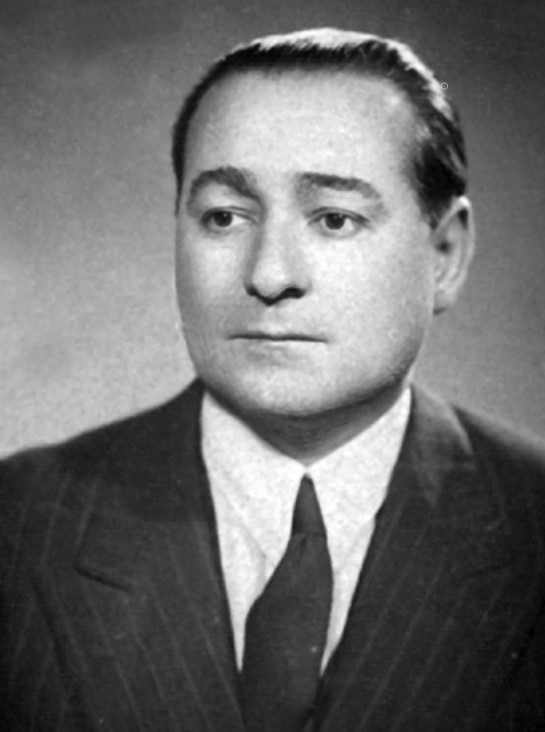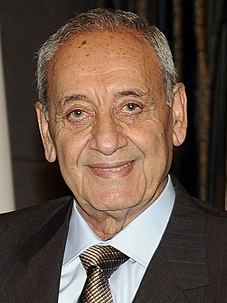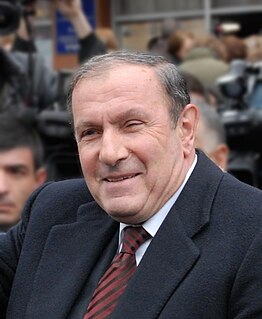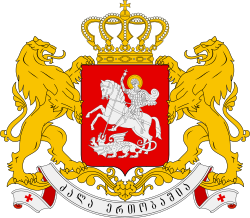
Constituent Assembly elections were held in the Democratic Republic of Georgia between 14 and 16 February 1919. The electoral system used was party-list proportional representation using the D'Hondt method in a single nationwide district. The result was a victory for the Social Democratic Labour Party of Georgia, which won 81% of the vote, and 109 of the 130 seats. In by-elections held in spring, they lost four seats and the Armenian Party in Georgia - Dashnaktsitiuni and the Georgian National Party both won seats.

General elections were held in Turkey on 12 October 1969. The electoral system used was party-list proportional representation using the D'Hondt method in 66 electoral districts. The result was a victory for the Justice Party, which won 256 of the 450 seats. Voter turnout was 64.3%.

General elections were held in Turkey on 10 October 1965. The result was a victory for the Justice Party, which won 240 of the 450 seats. Voter turnout was 71.3%.

General elections were held in Turkey on 15 October 1961. The electoral system used was party-list proportional representation with the D'Hondt method in 67 electoral districts. In order to receive seats in a district, parties needed to win a Hare quota in that district. The result was a victory for the Republican People's Party, which won 173 of the 450 seats. Voter turnout was 81.4%.

General elections were held in Turkey on 21 July 1946, the first multi-party elections in the country's history. The multiple non-transferable vote electoral system was used. The result was a victory for the Republican People's Party, which won 395 of the 465 seats.

General elections were held in Turkey on 14 May 1950, using the multiple non-transferable vote electoral system. The result was a landslide victory for the opposition Democratic Party, which won 408 of the 487 seats.

General elections were held in Turkey on 2 May 1954.The electoral system used was the multiple non-transferable vote. The result was a victory for the Democrat Party, which won 503 of the 541 seats. Voter turnout was 88.6%.

General elections were held in Turkey on 27 October 1957. The electoral system used was the multiple non-transferable vote, with each electoral district electing an average of 9 members. The result was a victory for the Democrat Party, which won 424 of the 610 seats.
General elections were held in Lebanon between 23 August and 11 October 1992, the first since 1972. Independent candidates won the majority of seats, although most of them were considered members of various blocs. Voter turnout was 30.3%.
General elections were held in Lebanon between 18 August and 15 September 1996. Independent candidates won the majority of seats, although most of them were considered members of various blocs. Voter turnout was 43.3%.

General elections were held in Lebanon between 27 August and 3 September 2000. Independent candidates won the majority of seats, although most of them were considered members of various blocs. Voter turnout was 40.5%.

Parliamentary elections were held in Armenia on 5 July 1995, with a second round on 29 July. There were 150 constituency seats and 40 elected on a national basis using proportional representation. The result was a victory for the Republican Bloc, which won 88 of the 190 seats. Overall voter turnout was 54.3%.

Parliamentary elections were held in Armenia on 30 May 1999. There were 75 constituency seats and 56 elected on a national basis using proportional representation. The result was a victory for the Unity Bloc, which won 62 of the 131 seats. Overall voter turnout was 51.7%.

Presidential elections were held for the first time in Armenia on 17 October 1991. The result was a victory for Levon Ter-Petrossian, who won 83% of the vote. Turnout was 70%.

Presidential elections were held in Georgia on 26 May 1991. The result was a victory for Zviad Gamsakhurdia of the Round Table-Free Georgia party, who won 87.6% of the vote, with an 82.9% turnout.

General elections were held in Georgia on 11 October 1992, in which voters elected both the Parliament and the Chairman of Parliament, who also acted as Head of State as the President, Zviad Gamsakhurdia, was in exile after being outsted in a coup in January. Independent candidate Eduard Shevardnadze was the only candidate in the election for Head of State, whilst the Peace Bloc won the most seats in Parliament. Voter turnout was 74.2%.

Presidential elections were held in Georgia on 9 April 2000. The result was a victory for Eduard Shevardnadze of the Union of Citizens of Georgia, who won 82.0% of the vote, with a 75.9% turnout.

Parliamentary elections were held in Georgia on 31 October 1999, with second rounds in some constituencies on 7 and 14 November, and repeat elections in two constituencies on 28 November. The result was a victory for the Union of Citizens of Georgia, which won 131 of the 235 seats. Voter turnout was 67.9%

A referendum on extending the presidential term of Nursultan Nazarbayev was held in Kazakhstan on 29 April 1995. Voters were asked "Do you agree to prolong the term of office of the President of the Republic of Kazakhstan Nursultan Nazarbayev, publicly elected on 1 December 1991, until 1 December 2000?" The question was approved by 95.5% of voters, with turnout reported to be 91.2%.
Events from the year 1947 in Jordan.













